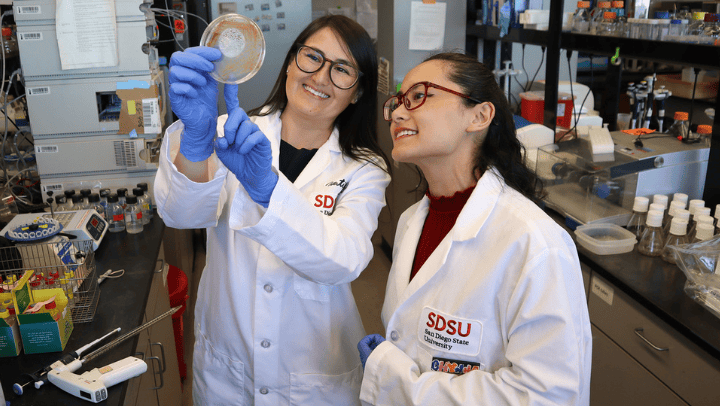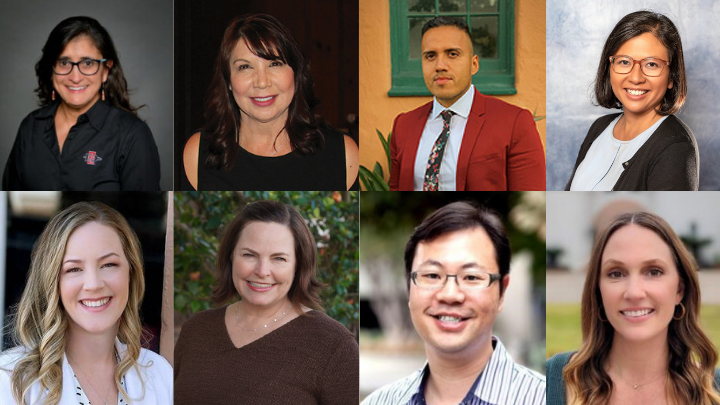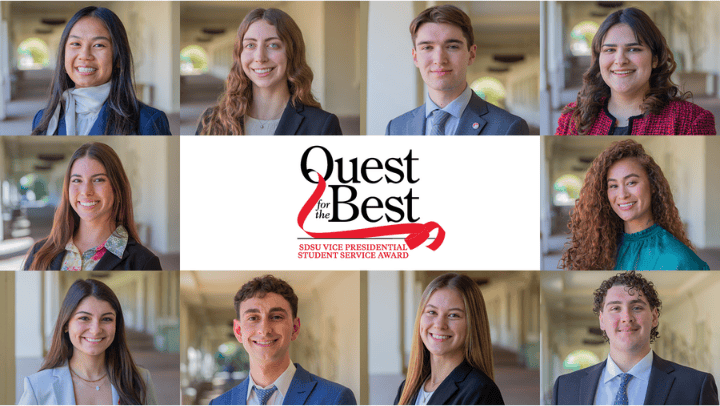SDSU earns R1 classification, joins top 5% of research universities in the U.S.
SDSU has, for the first time, been designated an R1 university, a category historically reserved for top-tier, research-intensive doctoral degree-granting universities.

Joining the top 5% of universities to be recognized in the Carnegie Classifications of Institutions of Higher Education, San Diego State University has been designated an R1 institution, a designation granted only to doctoral degree-granting universities with “Very High Research Spending and Doctoral Production.”
Announced on Feb. 13 by the Carnegie Foundation for the Advancement of Teaching and the American Council on Education (ACE), SDSU is among only 187 universities designated as R1 out of the just under 4,000 universities recognized by Carnegie. Among the 187, only 19 are also Hispanic-serving Institutions (HSIs).
SDSU is also the first campus in the California State University system to earn the prestigious recognition.
“R1 universities are economic engines in their states and regions, with teaching, research and innovation that foster entrepreneurship, and lead our graduates to prosperous jobs through partnerships with industries and government entities. We set it as an aspirational goal within our strategic plan five years ago, and we have now not only met, but exceeded that goal. It recognizes and supports more opportunities for our students, more breakthroughs from our researchers and more ways to serve our communities,” said SDSU President Adela de la Torre.
The rare cohort of R1 institutions is recognized for providing students access to high-quality research opportunities, faculty with renowned expertise in their fields and producing innovation and life-changing benefits through impactful research in STEM, the humanities, social sciences and other disciplines. This is happening at a time when an SDSU degree is also generating strong job placements and salaries for our graduates, contributing to their social mobility.
Specifically, SDSU was designated an R1 because the university exceeded the classification criteria, which requires that R1s spend more than $50 million on research programming and infrastructure and that they also confer at least 70 degrees to doctoral research graduates annually.
“This prestigious designation is not something for which we can apply, or that we can independently self-identify. It is one of the most preeminent acknowledgements recognizing the tireless work of our faculty and researchers and our students,” de la Torre said. “I invite our entire university community and those throughout our region and state to honor this achievement because every single one of us benefits from what our one SDSU community produces and achieves.”
Carnegie classifications rely on Integrated Postsecondary Education Data System (IPEDS) and Higher Education Research and Development (HERD) data as primary sources for determining institutional classifications. IPEDS, a nationwide survey, collects and standardizes data for all higher education institutions surveyed. This year’s classifications relied on 2022-23 data, which shows that SDSU conferred 123 research/scholarship doctoral degrees (such as Ph.D. and Ed.D. with a research focus) and university research expenditures total $158 million.
SDSU data, which accounts for all doctoral degree types, including research/scholarship doctoral degrees and professional doctoral degrees, placed conferrals much higher than the IPEDS national standardized data, with SDSU conferring in 2023-24 nearly 180 doctoral-level degrees annually for all degree types, including research/scholarship, professional practice and other doctoral degrees.
And SDSU researchers in San Diego and Imperial Valley continue to generate more grant funding. Researchers secured a record-breaking total of nearly $230 million in overall grants and contracts in 2023-24, a competitive total and the most recent year data is available. With $37.6 million more in funding compared to the year prior, 2022-2023, it was the third consecutive record-setting year. It was also the largest year-over-year growth (nearly 20%) in more than a decade.
The path to R1
SDSU's path to achieving R1 began in the mid-1960s, during a time when a group of retired professors began conversations that would lead the university to establish doctoral programs. At that time, and under President Malcolm Love, SDSU aspired to transform into a research university, and the chemistry department became home to the school’s first doctoral program.
Today, SDSU’s evolution is a testament to those and many other efforts, including a university-wide strategic plan launched in 2020 that set a goal of “Becoming a Premier Public Research University: A New Kind of HSI.” Since then, research activity has grown substantially.
“As a university deeply committed to advancing knowledge and addressing societal challenges, our R1 designation is a celebration of our community’s dedication to discovery and innovation, and of SDSU’s commitment to expanding knowledge and opportunity for our students,” said Vice President for Research and Innovation Hala Madanat.
“We are proud to see our impact recognized on a national scale,” Madanat said. “This designation not only acknowledges our past accomplishments but also energizes us to deepen our impact and expand our reach as leaders in innovation going forward.”
SDSU research is expansive and includes projects improving energy efficiency across industrial sectors, protecting power grids from cyber attacks, supporting students with disabilities, addressing climate adaptability, solving real-world problems through applications of artificial intelligence, and contributing to job creation and curriculum development to fuel a carbon-neutral economy across San Diego and Imperial Valley.
“This R1 designation is a testament to the dedication and innovative spirit of our faculty, researchers, staff and students. It underscores our commitment to advancing research that addresses significant community needs and drives economic growth in our region and beyond,” said Michèle G. Goetz, associate vice president and CEO for SDSU Research Foundation.
“With this recognition of SDSU’s leadership in research, scholarship and creative activities, our priority is to ensure our staffing and infrastructure supports this important work as research at SDSU continues to grow,” Goetz said.
Investments in doctoral students, advanced workforce needs
California’s Master Plan for Higher Education, which has guided the state’s public colleges and universities since it was written in 1960, mandated that doctoral education be left to the University of California system. Following years of SDSU leaders advocating for the ability to offer independent doctorates, Gov. Gavin Newsom signed Assembly Bill (AB) 656 in 2023, permitting SDSU – and all other CSUs – to offer independent professional and applied doctoral degrees.
At the time of the announcement, de la Torre called it “a revolutionary change for our system and for SDSU.”
In 2021, Tracy Love, was appointed the inaugural dean of the College of Graduate Studies, a new unit dedicated to raising the visibility of graduate education and elevating the university’s graduate programs.
“Our R1 designation underscores the strength and vibrancy of our graduate programs, which attract some of the brightest minds from across the globe,” Love said.
“Ultimately, what we are doing is enhancing both the undergraduate and graduate student experience and helping to move them into some of the most in-demand jobs in our region and state,” Love said. “This milestone highlights our commitment to fostering a dynamic research environment where graduate students play a central role in advancing knowledge and driving discovery.”
For more information about SDSU’s research achievements and R1 designation, visit the university’s R1 website.




